Following FirstGroup’s announcement that it is to order more trains to support its growth drive in the open access market, First Rail Managing Director Steve Montgomery explains the next steps to Rail Business UK.
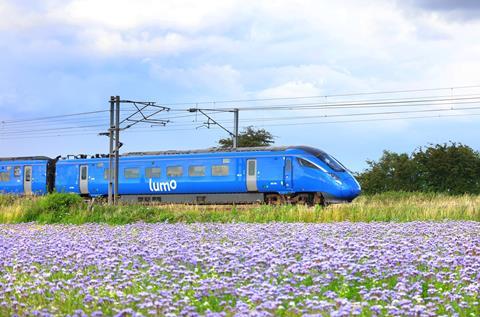
FirstGroup is betting big on open access to ensure it keeps a presence in the rail operating market once the government’s plan to take back the remaining Department for Transport-contracted private operators into the public sector has been completed.
The announcement on December 6 that FirstGroup had agreed to order 14 more five-car Class 80X trainsets from Hitachi Rail via Angel Trains was testament to its commitment to the open access model, and its Lumo brand in particular. If all of its applications for future services come to fruition, Lumo stands to emerge as a significant player on the Great Western and West Coast main lines, in addition to its high-profile London – Edinburgh service launched in October 2021.
Speaking to Rail Business UK, First Rail Managing Director Steve Montgomery says the company has ‘been able to prove with Lumo on the East Coast that we didn’t just take away from [incumbent LNER’s] patronage. They’ve grown, we’ve grown. We believe that the model now is not about revenue getting stripped out of one business, it’s about how we enhance the overall opportunity for the customer.’
From five cars to 10
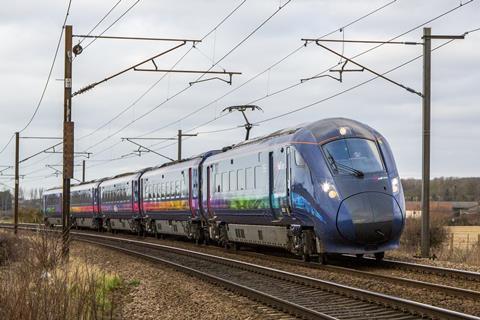
This enhancement begins with a deployment strategy for the batch of 14 trains just ordered. Montgomery explains that the additional trains will enable Lumo to strengthen its current services to 10 cars at times of higher demand, and the fleet will have flexibility to be deployed across different Lumo and Hull Trains services as required. ‘As we get a more homogenous fleet, that allows us to move things around about a bit more as well to be able to serve the markets at certain times of the year.’
Some of this will reflect seasonal demand that will differ across the various service groups. ‘At Hull Trains we already run 10 cars at certain times, but we need a bit more opportunity to run more [10 car trains] on that route; both of the businesses are expanding really well and doing really well and we need to be able to look to the future.’
Looking west
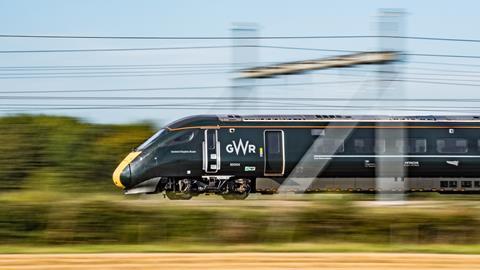
Turning to Wales and the west, FirstGroup intends to use some of the newly procured trains to launch a London – Carmarthen open access service in paths it has recently gained through the acquisition of Grand Union Trains Great Western Holdings Ltd.
Montgomery says First is planning to significantly rethink the plans first put forward by GUT, which had included a premium class section with 1+1 seating, alongside a 2+1 layout in standard class.
Montgomery also confirms that none of the team involved in developing the GUT proposals, including Managing Director Ian Yeowart, will join FirstGroup. ‘Obviously, we have a close relationship with them, and we continue to work with them in other ideas and thinking. But none of the people will transfer over with the company.’
The service will adopt the same single-class layout that Lumo uses on the East Coast route. Montgomery notes that while the competing Great Western Railway service is currently run by FirstGroup, this will not be the case by the time the Carmarthen service begins; transfer of the GWR contract to the government’s newly renamed in-house holding group DfT Operator Ltd is expected in 2026.
‘Great Western does a great job across there; for obvious reasons, we would say it does do a good job’, Montgomery says. ‘We’re not trying to compete in that type of market, we’re trying to bring new people to the market.
‘We knew that GWR was going to go back, because it was at the end of its two year extension’, he says. While FirstGroup’s current GWR contract term ends in June 2025, ‘we think the transfer is at least 12 months away. If you listened to the announcement, they’re taking one [operator] back every three months, that would suggest Great Western is going to be with us into 2026.’
Traction choices ahead
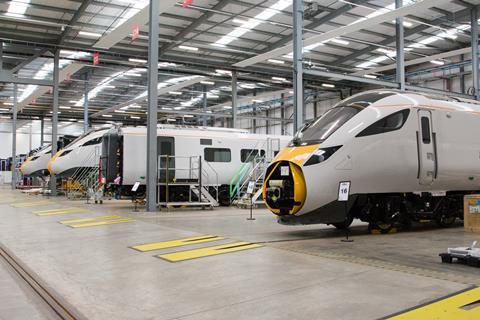
Returning to the train order, Montgomery reports that no decision has yet been taken on the power options for the initial batch of 14 trainsets, which could include electric, battery-electric or electro-diesel.
The final choice may depend on the success of First’s outstanding track access applications. These cover various new routes and service extensions, including the Edinburgh – Glasgow addition to the current Lumo route, and a high-profile revival of the London Euston – Manchester Victoria – Rochdale service briefly run by First North Western in 1998-2000. The London – Carmarthen service would be augmented by a new Lumo service between London and Paignton, while an application is also in place covering a Hull Trains service between London and Sheffield via Retford and Worksop.
FirstGroup says that if any of these applications are successful, it has the option to invest another £460m for a further 13 five-car trains. This is being widely interpreted as a challenge to the government to secure the medium-term future of Hitachi’s Newton Aycliffe assembly plant.
Global examples sought
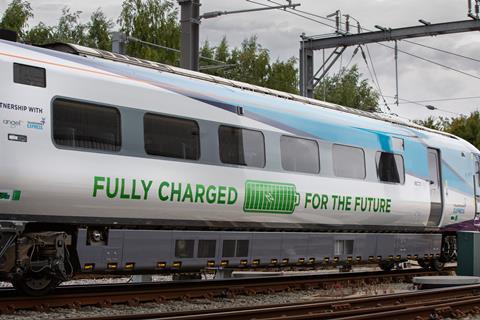
Montgomery says that the final specification of the fleet does not need to be finalised until ‘later next year’, giving it and the leasing company time to assess the best traction mix. One area of interest is the use of battery power to get from the limit of the wires east of Manchester Victoria as far as Rochdale, approximately 13 km further along the steeply graded Calder Valley line towards Leeds.
‘One of the things that we said initially when we put the applications in, particularly for Rochdale in a follow-on order, is that we’re looking at what battery technology is available’, Montgomery explains. FirstGroup is keen to work with Hitachi to ‘understand what type of traction is available to us. Clearly, we can move to battery and we feel that’s more environmentally friendly. We would also say, hopefully, more reliable as well with less maintenance needed for the trains.’
The recent demonstration of a battery pack fitted temporarily to a TransPennine Express Class 802 set by Hitachi has also provided data that will feed into the decision, with a clearer understanding of the mileages that are possible on battery power away from the wires. ‘Technology is moving on really quickly. Hitachi is a very large company, so we want to see what other trials they’ve done across the globe have demonstrated, not just in the UK.’
However, the next steps clearly hinge on the critical approvals on paths and certification from the regulator. ‘We are not aware of when the ORR is ready to make decisions’, Montgomery admits. ‘They have not yet indicated when they’re ready to move forward with that. We hope that will be sometime early in the new year that we’ll start to hear on certain applications. The Glasgow and Sheffield applications are just an extension of Hull and Lumo. Then we’ve got the bigger applications in that we would like to hear about sometime early next year.’
Good for the economy
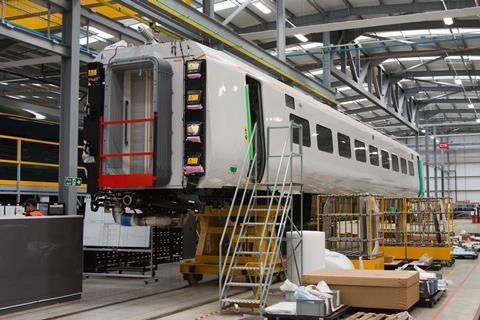
‘We want to see where these applications can take us, we believe it’s good for the whole of the economy’, Montgomery insists.
‘It’s an ongoing train order for Newton Aycliffe, it helps put further competition into the market, and it gives us greater opportunities. It is new markets we’re opening up, particularly to Rochdale where the application would give a large community — more than 100 000 people — direct access [to London services] for the first time in 25 years.’
- FirstGroup has confirmed to Rail Business UK that it still hopes to launch the Stirling – London Euston open access service inherited from GUT by December 2027. However, a spokesman said rolling stock options for this route are still being evaluated, and it is not yet covered by the fleet orders announced on December 6. FirstGroup had hoped to deploy Class 222 DEMUs on the service, but the date when this fleet will be released by East Midlands Railway remains uncertain amid delays in commissioning the incoming Class 810 trainsets.



